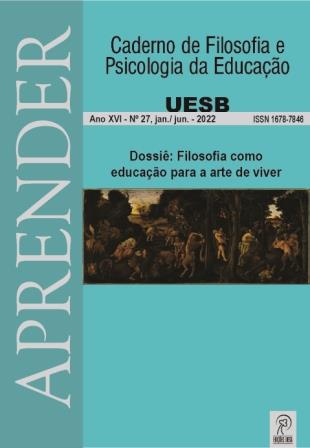AMOR FATI LIKE POSSIBILITY OF ETHICAL LIFE IN NIETZSCHE
DOI:
https://doi.org/10.22481/aprender.i27.10719Keywords:
Overman, Eternal Return, NietzscheAbstract
The present work focuses on reflecting on the relationship between the concept of Overman and the Eternal Nietzsche. With such concepts Nietzsche intends to establish a new relationship with life and time. The overman (or superman) consists in the overcoming of man, that is, in the need to overcome the once the greatest historically consolidated reference has been lost, namely, to God. Nietzsche longs for a new life-affirming man, a “higher type”. In this sense, the Eternal Return is related to the Beyond of man. The abyssal thought (Read, Eternal Return) is a terrible thought, since it affirms that all things return eternally, without ceasing; but, Nietzsche thinks: he affirms the eternal return of things is the maximum expression of the importance of life, of amor fati. It is not by chance that Nietzsche relates it to the overman, “superior type”: overman, eternal return and amor fati are, in the last instance, the marks of a new culture in overman that prevails. to a record of life.
Downloads
References
CALOMENI, Tereza Cristina B. A proclamação nietzschiana de retorno do trágico dionisíaco. In: O que nos faz pensar. Rio de Janeiro: PUC, 2011.
__________. O segredo abissal de Zaratustra. In: DIAS, Rosa. Leituras de Zaratustra. Rio de Janeiro: Mauad X, 2011.
MACHADO, Roberto. Nietzsche e a verdade. Rio de Janeiro: Graal, 1999. ________. Zaratustra, tragédia nietzschiana. Rio de Janeiro: Zahar, 2011.
MARTON, Scarlett. Nietzsche: a transvaloração de todos os valores. São Paulo: Editora Moderna, 1996.
MULLER-LAUTER, Wolfgang. Nietzsche: sua filosofia dos antagonismos e os antagonismos de sua filosofia. São Paulo: Unifesp, 2011.
NABAIS, Nuno. Metafísica do trágico: estudos sobre Nietzsche. Lisboa: Relógio D’Água, 1997.
NIETZSCHE, F. Para a genealogia da moral; uma polêmica. São Paulo: Companhia das Letras, 2010a.
________. Além do bem e do mal. São Paulo: Companhia das Letras, 2010b.
________. A gaia ciência. São Paulo: Companhia das letras, 2012.
________. Assim falou Zaratustra. São Paulo: Companhia das letras, 2011.
________. Humano, demasiado humano. São Paulo: Companhia das letras, 2013.
________. Obras incompletas. São Paulo: Nova Cultural, 1978. (Coleção Os Pensadores).
______. Ecce homo: ou como alguém se torna o que é. São Paulo: Companhia das letras, 2009.
PASCHOAL, Antônio Edmilson. Nietzsche e a autossuperação da moral. Ijuí, SP: Unijuí, 2009.
RUBIRA, Luís. Nietzsche: do eterno retorno do mesmo à transvaloração de todos os valores. São Paulo: Barcarolla, 2010.
Downloads
Published
How to Cite
Issue
Section
License
Copyright (c) 2022 APRENDER - Caderno de Filosofia e Psicologia da Educação

This work is licensed under a Creative Commons Attribution-ShareAlike 4.0 International License.






